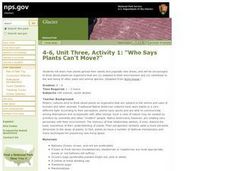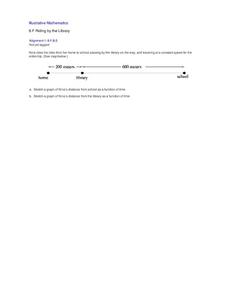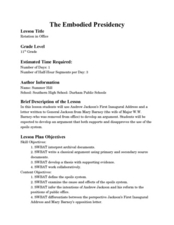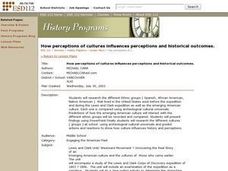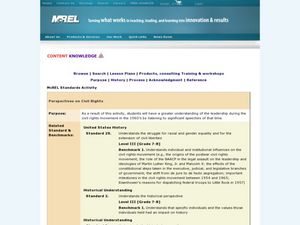Curated OER
My Action Plan
Twelfth graders work on completion of their personal Action Plan. They write down the due date on their Action Plan and view sample Action Plans in order to have a better understanding of what theirs should look like. After assessing how...
Curated OER
Early Jazz
Young scholars gain an understanding of early jazz. They study Dixieland and the Roaring Twenties. They examine the American historical significance and cultural implications of early jazz.
Curated OER
Net "Working"
Upper elementary and middle schoolers explore the properties of various polygons. They use video, resource links, and engage in hands-on activities in order to construct geometric nets. This fine plan should lead to increased...
Curated OER
Twain's Hannibal
Students use primary resources to examine the context the writings of Mark Twain. They criticize the resources for reliability, accuracy, perspective, relevancy, and authoritativeness.
Curated OER
Alphabet Sideshow
Learners practice sound and recognition of letters in alphabetical sequence. They gain an understanding of letter sounds and order. They create a slide show with graphics and text. They present their slide show to the class.
Curated OER
Remembering the Forgotten War
Ninth graders examine the major events and significance of the Korean War, including U.S. involvement in the war. In this World History lesson, 9th graders read primary source materials to understand the political, social, emotional...
Curated OER
Galaxies
The first thing to note is that this lesson plan was written for use in a parochial school. Even if you are in a non-religious setting, however, the website exploration of galaxies and the accompanying worksheet make for an engaging...
Curated OER
Who Says Plants Can't Move?
Students discover how plants spread their seeds using other plants and animals. In this plant lesson, students role play different plants and how their seeds travel. Students then have a class discussion to ensure their understanding.
Curated OER
Masks of Africa
Students explain the purpose of masks to various cultures in Africa. They recognize the conceptual patterns used to create African masks and illustrate their understanding by creating their own masks
Autism Inspiration
Why We Use Our Words
Here is a lesson designed for children with autism which is aimed at helping them understand that using their words to express what they need is an important social skill. They are charged with using their words to explain to the teacher...
Illustrative Mathematics
Riding by the Library
Draw a graph that shows the qualitative features of a function that has been described verbally. Make sure learners understand where time is zero and the distance is zero. It may take them some time to understand this concept, so working...
Edgate
Discovering New Resources
What is a natural resource, and what resources did the Lewis and Clark expedition seek? After reading an article on the mapping of the west, learners get into small groups to discuss the important natural resources of the period. They...
Curated OER
Fantastic Fossils
Students learn about the kinds of fossils and what scientists can learn from them. In this earth science lesson, students are told how engineers and paleontologists work together. Then students create a "fossil fondue" and...
Curated OER
Rotation in Office
Eleventh graders explore the concept of the spoils system. In this presidential history lesson, 11th graders examine Andrew Jackson's Inaugural Address as well as a letter to him from Mary Barney in order to gain an understanding of the...
Curated OER
Historical Locations of The Civil Rights Movement
A geographic perspective helps historians learn about significant eras such as the civil rights movement. Through research and source analysis, learners create a report depicting a significant location of this time. They synthesize their...
Shmoop
ELA.CCSS.ELA-Literacy.RI.9-10.8
Your learners need to develop skills to argue effectively, and this comes by understanding the traditions that make claims valid, and what detracts from their effectiveness. Although this resource does not give advice on how to...
Curated OER
One Step At A Time
Students begin the instructional activity by discussing how two people watching the same event can see it differently. After viewing an overhead transparency, they report on what they saw after being called upon. They discover that what...
Curated OER
Opposites
Young scholars choose a category to discuss and write down the name of an activity that represents the various characteristics. They record their responses on a class sheet and discuss how it feels when someone disagrees with them. They...
Curated OER
Searching for Ourselves in Novels
Students select a novel of their choice and complete assignments that are self-assigned. Students display responsibility in completing self-assigned projects and meet deadlines.
Curated OER
Beauty
High schoolers share what they think of when they hear the word beautiful. Individually, they bring in an object they believe is beautiful based on its relationship to a person, idea or event. They view each others object and write...
Curated OER
To Be or Not to Be Democratic
Seventh graders explore the democratic republic principles of U.S. government. In this U.S. government lesson, 7th graders compare and contrast the governments of ancient Athens,the Roman Republic, and the United States today. Students...
Curated OER
Explore the Motivations of Kurdish Nationalists
Students watch a video showing the viewpoint of Kurdish Nationalists. They take notes during the video on why the Kurds want their own country. They role play a meeting between the Kurds and Iraq's National Assembly.
Curated OER
How Perceptions of Cultures Influences Perceptions and Historical Outcomes
Students research different ethnic groups that lived in the United States. They compare and contrast Spanish, African American and Native American cultures and how American culture interacted with them. They present their findings...
Curated OER
Perspectives on Civil Rights
Students examine speeches of the Civil Rights Era. For this American history lesson, students listen to speeches delivered by Martin Luther King, Jr. and John F. Kennedy. Students respond to guiding questions as they listen to the...







